Recently I have a family member who bought an iPod Pro. They are 70 years old. He understands Audiology and wasn't an Apple product person. Until he owned an iPod Pro. He has extreme hearing loss and wanted to try them. After buying 1000..`s dollars on expense hearing Aids. Now he says since the battery life is about 6 hours, he needs two sets of iPod Pro for daily use. It is inexpensive to buy 2 iPod pro sets than more costly traditional hearing aids
Got a tip for us?
Let us know
Become a MacRumors Supporter for $50/year with no ads, ability to filter front page stories, and private forums.
iOS 18.1: Take a Hearing Test With AirPods Pro 2
- Thread starter MacRumors
- Start date
- Sort by reaction score
You are using an out of date browser. It may not display this or other websites correctly.
You should upgrade or use an alternative browser.
You should upgrade or use an alternative browser.
Sorry if I have missed it, but what exactly is your objection to Apple's hearing test? I wasn't able to get it to work on my iPad, but the descriptions make me believe it is just like a basic audiology test. Hearing aid makers have had online versions of those tests around for years. The main difference I see is those online tests ended with you having to walk into a hearing aid dealer to actually buy the hearing aids, whereas Apple configures the AirPods to work as hearing aids if your hearing loss fits into the mild to moderate range. So to me, any danger is from cutting out direct contact with a hearing professional, not anything in the test itself.I'm not talking about the hearing aid feature, my problem is with the hearing test feature. I use the hearing aid features to connect my cochlear implants to my iPhone 15. But, given what I have learned from studying audiology, I would not trust the AirPods hearing test feature any further than I could throw it.
That’s a very good point.There's even more to it when you consider that this tech is contributing to medical science, and that the hearing test is just one component of a suite of hearing health services available through Apple products that many people own, such as iPhone and AirPods Pro 2.
https://www.apple.com/newsroom/2021/03/apple-hearing-study-shares-new-insights-on-hearing-health/
3dBHL (left ear); 4dBHL (right ear)
Not bad. To be fair I have never been worried about hearing loss as I think I can hear relatively well but it’s nice to do a test and see.
Not bad. To be fair I have never been worried about hearing loss as I think I can hear relatively well but it’s nice to do a test and see.
Is your iPhone/iPad on iOS 18.1?link to hearing test doesnt work
I'm not talking about the hearing aid feature, my problem is with the hearing test feature.
I would not trust the AirPods hearing test feature any further than I could throw it.
The test merely measures each ear’s sensitivity across a range of frequency groups to build a profile. The procedure is very similar to that carried out by an audiologist and the result looks very similar. What’s the basis for your lack of trust. Can you cite some evidence to support your view that it shouldn’t be trusted? If it’s so untrustworthy, perhaps to the point of being unsafe as you seem to suggest, why did the FDA give it their approval?
No, it is nowhere near a real audiology test. A real audiology test will include:Sorry if I have missed it, but what exactly is your objection to Apple's hearing test? I wasn't able to get it to work on my iPad, but the descriptions make me believe it is just like a basic audiology test. Hearing aid makers have had online versions of those tests around for years. The main difference I see is those online tests ended with you having to walk into a hearing aid dealer to actually buy the hearing aids, whereas Apple configures the AirPods to work as hearing aids if your hearing loss fits into the mild to moderate range. So to me, any danger is from cutting out direct contact with a hearing professional, not anything in the test itself.
- Air tone test
- Bone conduction tone test
- Speech recognition test
- Speech discrimination test
- Tympanometry test
- ABR (auditory brain response)
- OAE (otoacoustic emission)
- Acoustic reflex test
Yea, I ended up running it through the shortcut method and oddly that made it work hahaIs your iPhone/iPad on iOS 18.1?
Well, I can't recognize half of those tests you list. Obviously, they were needed in your case, but not in every case.No, it is nowhere near a real audiology test. A real audiology test will include:
In the 35+ years that I have dealt with audiologists I can tell you that AirPods cannot possibly perform most of those tests. What do we do once hearing loss is suspected? Do we Increase the sound so we can make up for the hearing loss? There are many illnesses and diseases that can gradually reduce our sense of hearing. Untreated, and even mistreated, hearing loss will worsen over time. That is what happened to me, I didn't take my hearing loss seriously and didn't get hearing aids until it was too late. Now I am at about 2% hearing in each ear and can never get my full hearing back. I am making a fuss so that other people don't end up in my condition, don't assume that the AirPods hearing test results equate to a proper hearing examination.
- Air tone test
- Bone conduction tone test
- Speech recognition test
- Speech discrimination test
- Tympanometry test
- ABR (auditory brain response)
- OAE (otoacoustic emission)
- Acoustic reflex test
I'm sorry your condition wasn't diagnosed earlier, and I do understand your trepidation that Apple's hearing test might cause people to not seek professional help. But what are you recommending -- that everyone walk into an audiologist and demand all those tests? Some people have conditions like yours, which could have been alleviated if caught and treated earlier. Then there are cases like mine, where my hearing loss has remained pretty much the same for decades, ever since my hearing was first tested in grade school. And of course, there's the typical age-related hearing loss.
I do think the last case is the best use for the AirPods Pro hearing aid feature, and anyone under, oh say 60, who notices any hearing loss should have their hearing checked by qualified professionals. In fact, it would be ideal if hearing checkup was part of our periodic routine physicals. But you yourself say you noticed your hearing loss and ignored it -- would you have ignored it any less if the Apple hearing test had been available back then? Or could this very discussion influence somebody reading it to seek help? If so, you would have done a real service. But the opportunity came about because Apple released this feature.
I am recommending that Apple place, on every media source where AirPods hearing test is mentioned, the big bold words:Well, I can't recognize half of those tests you list. Obviously, they were needed in your case, but not in every case.
I'm sorry your condition wasn't diagnosed earlier, and I do understand your trepidation that Apple's hearing test might cause people to not seek professional help. But what are you recommending --
This is NOT a complete audiological hearing test
I feel this would better inform AirPods users.. that is all I am asking.
Edit: I have spoken with many hearing aid users over the years, and all of them went through almost every one of those tests the first time they visited their audiologist.
Last edited:
Yeah, a disclaimer like that would make sense.I am recommending that Apple place, on every media source where AirPods hearing test is mentioned, the big bold words:
This is NOT a complete audiological hearing test
I feel this would better inform AirPods users.. that is all I am asking.
Edit: I have spoken with many hearing aid users over the years, and all of them went through almost every one of those tests the first time they visited their audiologist.
As for audiology tests, I only recognize the first four you listed, and I believe I had the bone conduction test only once or twice. The speech recognition/discrimination tests were sometimes done and sometimes not. Not sure what accounts for the discrepancy in our experiences. Different time, different country? Maybe an audiologist did all those the very first time, and I was too young to remember?
Well, that list of tests is primarily to identify the type, and possibly the cause, of hearing loss you have. After that they usually only do the tone and speech tests to ascertain if your level of loss is changing. The discrepancy in our experiences is likely due to the different kinds and causes of hearing loss.. which is another thing that the AirPods hearing test can't identify. Yeah, Apple really needs to add a disclaimer.. but that might paint their AirPods hearing test in a negative light. And, if the public sees one health feature on an Apple product as a negative then that brings into question all of the other health features on Apple products.Yeah, a disclaimer like that would make sense.
As for audiology tests, I only recognize the first four you listed, and I believe I had the bone conduction test only once or twice. The speech recognition/discrimination tests were sometimes done and sometimes not. Not sure what accounts for the discrepancy in our experiences. Different time, different country? Maybe an audiologist did all those the very first time, and I was too young to remember?
Personally, I’m glad of the hearing test. I don’t need hearing aids but I do need the media assist function for watching TV as I don’t hear all tones well. It also means that music is clearer too - I can hear some instruments I hadn’t heard before. I sure notice the difference if I go back to my AirPod Max or Bose Quiet 45 headphones.
I’m delighted that I bought the APP2 a week ago - it’s been a good addition to my life.
I’m delighted that I bought the APP2 a week ago - it’s been a good addition to my life.
Best I can recall is that my hearing was originally tested annually, and when it turned out it wasn't progressive, no further tests were done to determine the cause. I think the doctors just felt it was part of the congenital brain damage that caused my Cerebral Palsy.Well, that list of tests is primarily to identify the type, and possibly the cause, of hearing loss you have. After that they usually only do the tone and speech tests to ascertain if your level of loss is changing. The discrepancy in our experiences is likely due to the different kinds and causes of hearing loss..
I get what you are saying, but isn't that what the PR department is for? I think overall, it's good that Apple has made this inexpensive hearing aid function available, it's working pretty nicely for me so far. But they could also do more to raise awareness about when consulting professionals is advisable. Like I think with the sleep apnea detection, they say something like "if the watch says you might have sleep apnea, go see a doctor" right? Doesn't have to be that elaborate or complex, just a one line disclaimer along what you suggested.which is another thing that the AirPods hearing test can't identify. Yeah, Apple really needs to add a disclaimer.. but that might paint their AirPods hearing test in a negative light. And, if the public sees one health feature on an Apple product as a negative then that brings into question all of the other health features on Apple products.
15 dBHL right ear, 25 dBHL left ear, mostly in the higher frequencies. Honestly a little less loss than I figured, but not at all surprised that it's in the mid-high and above frequencies (>2kHz), as that matches my perception/experience. It also makes sense that it's slightly higher in the left ear, as I've spent many years and a lot of hours driving at highway speeds with my car window (on my left side) partially or fully open, with a lot of wind noise.
I also have pretty significant tinnitus which probably affects the results, as I'd imagine it raises the noise floor internally in a way that can't be measured. Too many loud concerts, jam sessions with bands, and a 30+ year career of being almost constantly exposed to loud noises. I can remember going to concerts as a teen where my ears would ring for two days afterwards.
I also have pretty significant tinnitus which probably affects the results, as I'd imagine it raises the noise floor internally in a way that can't be measured. Too many loud concerts, jam sessions with bands, and a 30+ year career of being almost constantly exposed to loud noises. I can remember going to concerts as a teen where my ears would ring for two days afterwards.
Not available in Italy, as usual. I mean... I wouldn't complain if I had paid these devices 20-30% less than US people. Thing is we pay even more!
I understand what your concern is, which is personal to you, but keep in mind that Apple has spent years working on this, and they claim that it is accurate and they have the backing of the FDA to the extent that this is marketed as an over-the-counter remedy.I'm not talking about the hearing aid feature, my problem is with the hearing test feature. I use the hearing aid features to connect my cochlear implants to my iPhone 15. But, given what I have learned from studying audiology, I would not trust the AirPods hearing test feature any further than I could throw it.
Furthermore, Apple has integrated the test into the hearing aid feature. The integrated test establishes whether the hearing aid feature can be used and sets up the parameters according to the results of the test. The disclaimer is that the hearing aid feature "is intended for people with perceived mild to moderate hearing loss" and my understanding is that if the test determines severe loss then it will advise the user to seek medical advice.
There will always be outlier candidates for whom this test is not appropriate, but for a majority of people who take advantage of the test, it seems like it will have a net benefit. That's my take, at least.
I was curious what kind of message, if any, Apple provides to people who score a severe or profound loss. Unfortunately, I couldn't get the hearing test to work on my iPad -- no idea why. If anyone knows what actually happens when you score low on the hearing test, please do post here.The disclaimer is that the hearing aid feature "is intended for people with perceived mild to moderate hearing loss" and my understanding is that if the test determines severe loss then it will advise the user to seek medical advice.
Apple's own video does not say, other than that it will not enable the hearing aid function unless the test returns mild to moderate loss. So if the test returns any other result, you cannot activate the hearing aid function.I was curious what kind of message, if any, Apple provides to people who score a severe or profound loss. Unfortunately, I couldn't get the hearing test to work on my iPad -- no idea why. If anyone knows what actually happens when you score low on the hearing test, please do post here.
The reality is that this is just another OTC remedy that will never be as good as a prescription remedy. But until the costs for the prescription aids come down drastically, the AirPods may be a good alternative for people who could benefit from something over nothing. That is the niche.
Yes, the higher frequencies are always damaged first because those nerve endings are at the beginning of the cochlea. Lower frequencies travel further into the cochlea and loud lower frequency sounds damage the higher frequency nerve endings on their way through.15 dBHL right ear, 25 dBHL left ear, mostly in the higher frequencies. Honestly a little less loss than I figured, but not at all surprised that it's in the mid-high and above frequencies (>2kHz), as that matches my perception/experience. It also makes sense that it's slightly higher in the left ear, as I've spent many years and a lot of hours driving at highway speeds with my car window (on my left side) partially or fully open, with a lot of wind noise.
I also have pretty significant tinnitus which probably affects the results, as I'd imagine it raises the noise floor internally in a way that can't be measured. Too many loud concerts, jam sessions with bands, and a 30+ year career of being almost constantly exposed to loud noises. I can remember going to concerts as a teen where my ears would ring for two days afterwards.
I've had more than one audiologist tell me that the leading theory is that tinnitus is created by the brain in an attempt to avoid sensory deprivation.
Last edited:
Yes 4khz usually being the first to "break", hence the tinnitus..Yes, the higher frequencies are always damaged first because those nerve endings are at the beginning of the cochlea. Lower frequencies travel further into the cochlea and loud lower frequency sounds damage the higher frequency nerve endings on their way through.
I've had more than one audiologist tell me that the leading theory is that tinnitus is created by the brain in an attempt to avoid sensory deprivation.
I was able to take test on same day you uploaded this post but today I tried to open shortcut and it’s not loading is it because updated to iOS 18.2 beta 3 and AirPods firmware updated??
If you're concerned about hearing loss and own AirPods Pro 2, Apple in iOS 18.1 offers a convenient new clinical-grade hearing test that's easy to use. Here's everything you need to know about checking your hearing health with this new feature.
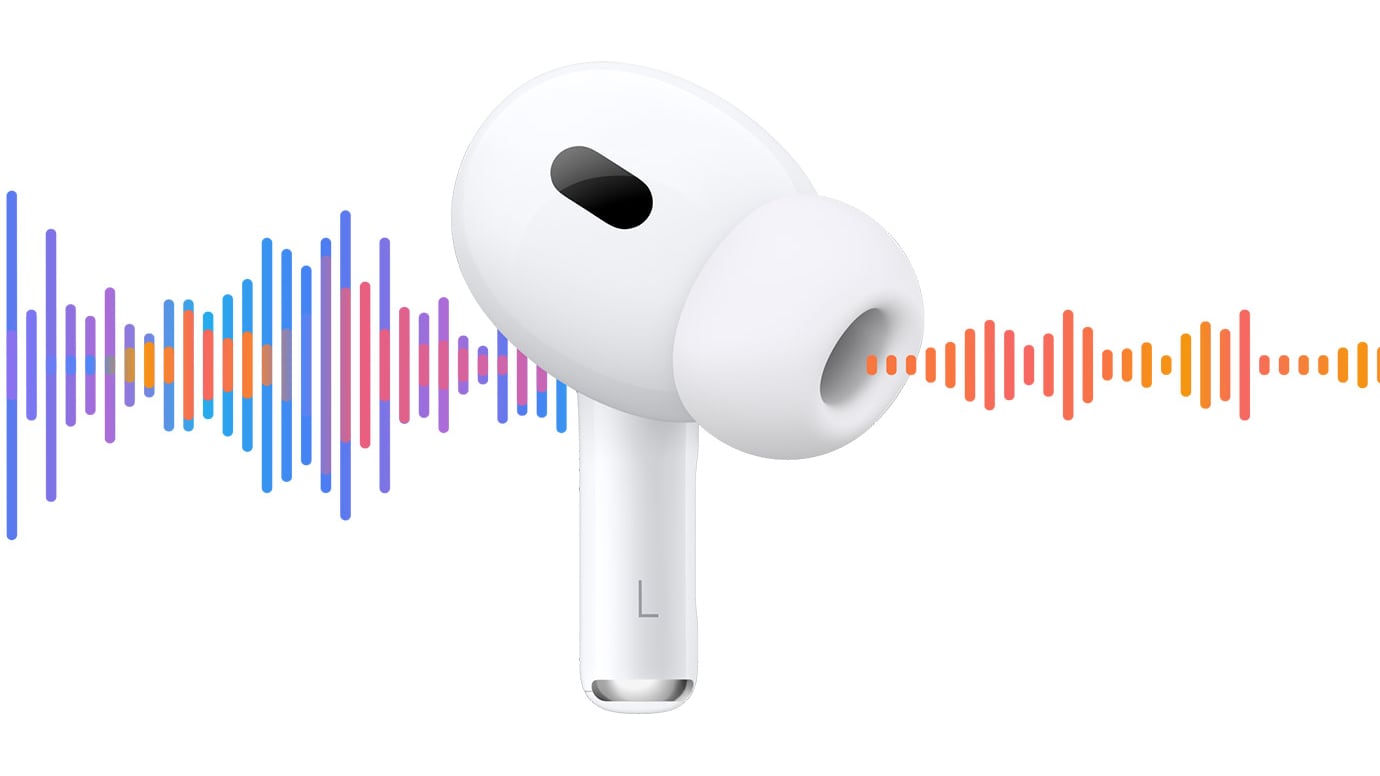
Note that Apple's Hearing Test feature is not available in all regions, likely due to differing regulatory laws. Apple maintains a list on its website of regions and territories where the test is available. If your location isn't on the list, you can still take the test – see the last section of this article for details.
What You Need
- AirPods Pro 2 updated with the latest firmware
- iPhone or iPad running iOS/iPadOS 18.1 or later
- A quiet environment
- About 5 minutes of uninterrupted time
The Hearing Test requires that you listen for a comprehensive range of tones at different and sometimes very low volumes. For this reason, it's important to take the test in a quiet environment for the full duration of the test, free from intermittent noise, people talking, or loud air conditioning or fan systems nearby.
Taking the Hearing Test
Make sure your AirPods Pro 2 are sufficiently charged before taking the test.
- Put your AirPods Pro 2 in your ears.
- Open Settings on your iPhone.
- Tap your AirPods Pro name at the top of Settings.
- Under "Hearing Health," tap Take a Hearing Test.
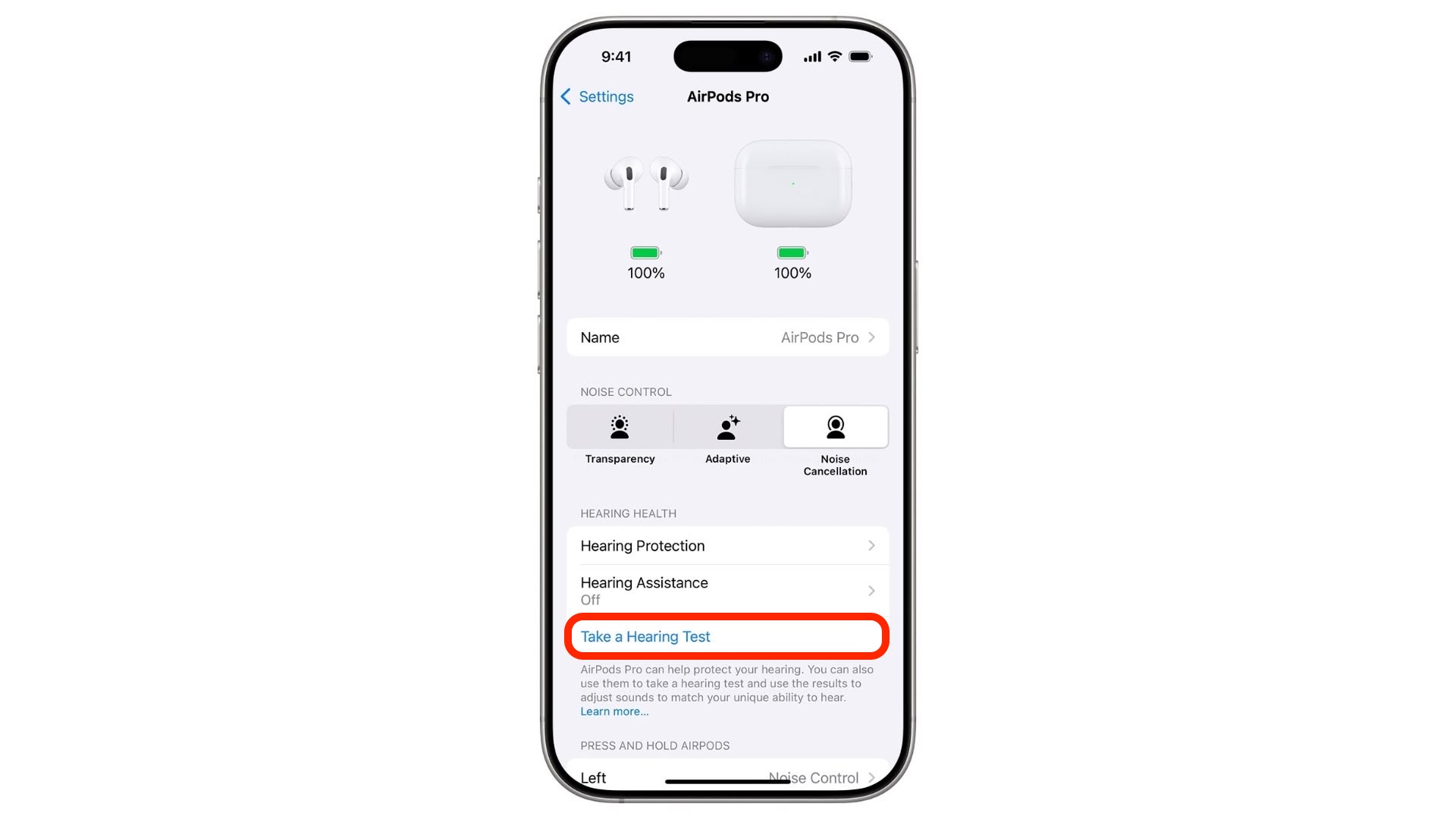
Answer the preliminary questions about your age and recent loud noise exposure.
- Follow the fit test to ensure your ear tips create a proper seal.
- When the test begins, tap the screen each time you hear a tone.
- Complete the test for both ears (the test will automatically switch sides).
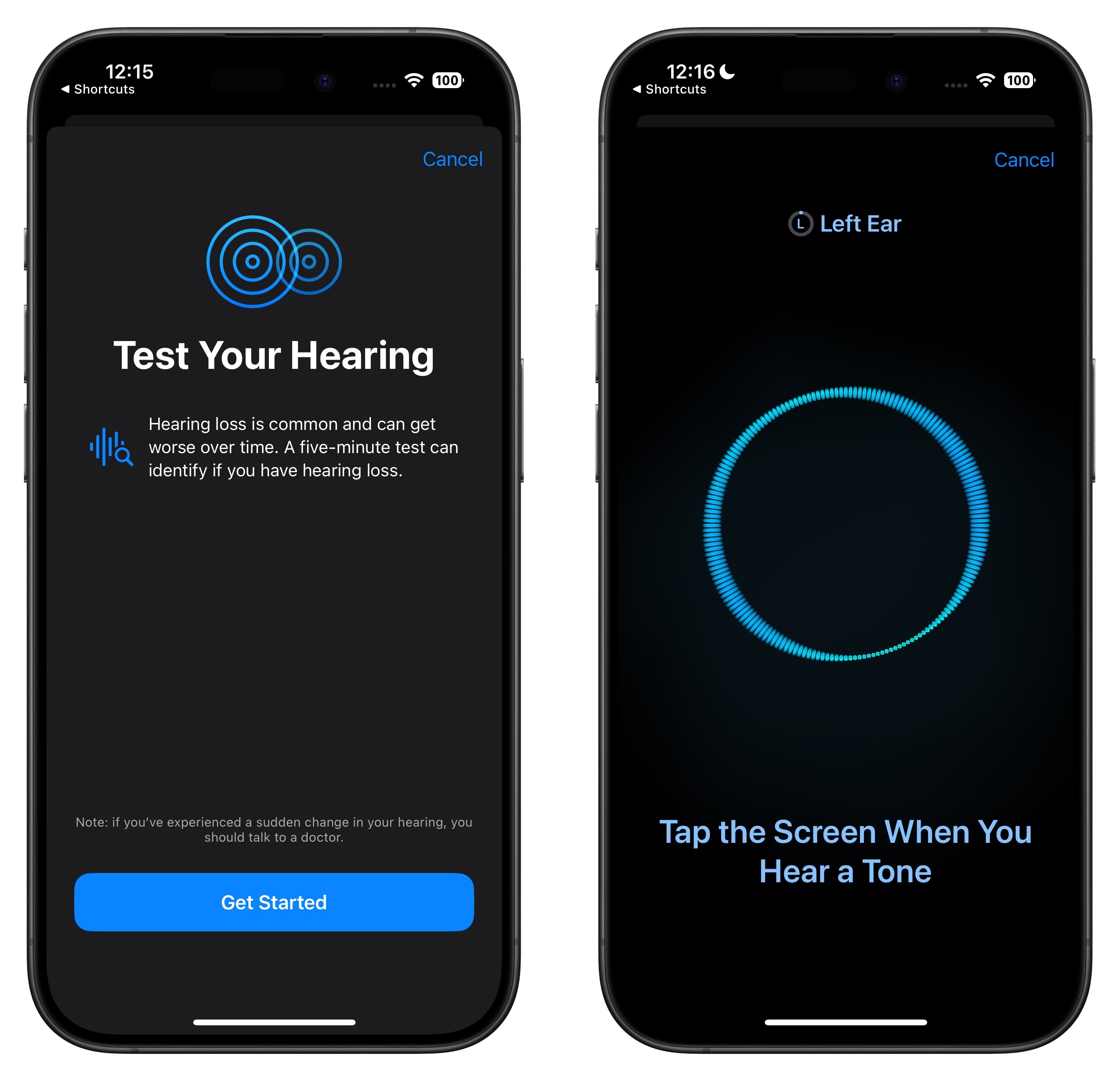
Understanding Your Results
The test measures your hearing in dBHL (decibel hearing level) and provides an easy-to-read classification:
Tap "Show Details" to see a frequency-by-frequency breakdown of your hearing ability. This graph shows how well you hear different pitches, from low (250 Hz) to high (8 kHz). This detailed view can help identify specific types of hearing loss and is the same format audiologists use, making it easy to share with healthcare providers.
Up to 25 dBHL: Little to no hearing loss - can hear normal conversation easily
- 26-40 dBHL: Mild hearing loss - can hear normal speech at close range
- 41-60 dBHL: Moderate hearing loss - requires raised voices to understand speech
- 61-80 dBHL: Severe hearing loss - can only hear very loud speech or shouting
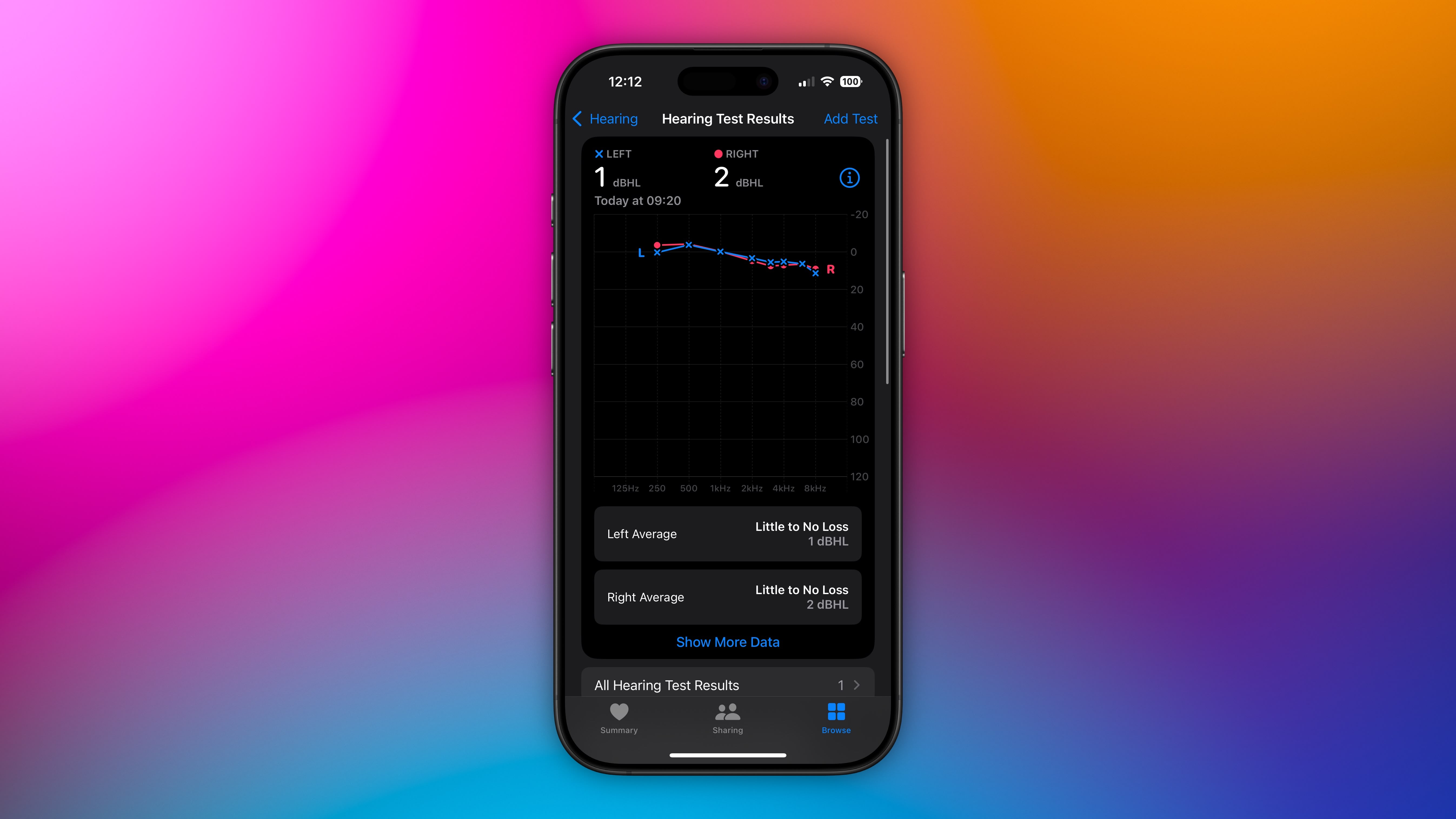
You can access your test results anytime in the Health app. Tap Browse ➝ Hearing, then tap Hearing Test Results to view your history. To share your results with healthcare providers, tap Export PDF at the bottom, or tap the Share button to email or save the audiogram.
After the Test
The results of your test can be used to unlock additional AirPods Pro 2 features and options including Media Assist and Hearing Aid mode.
Media Assist
If mild to moderate hearing loss is detected, you can enable Media Assist to optimize audio for your hearing profile:
Media Assist will then automatically adjust music, videos, and calls to enhance frequencies you have trouble hearing.
- Go to Settings ➝ your AirPods Pro
- Scroll down to Hearing Health
- Tap Media Assist.
- Toggle Media Assist on.
- Choose Use Hearing Test Results to apply your recent test data, or Custom Setup to manually adjust settings.
Hearing Aid Mode
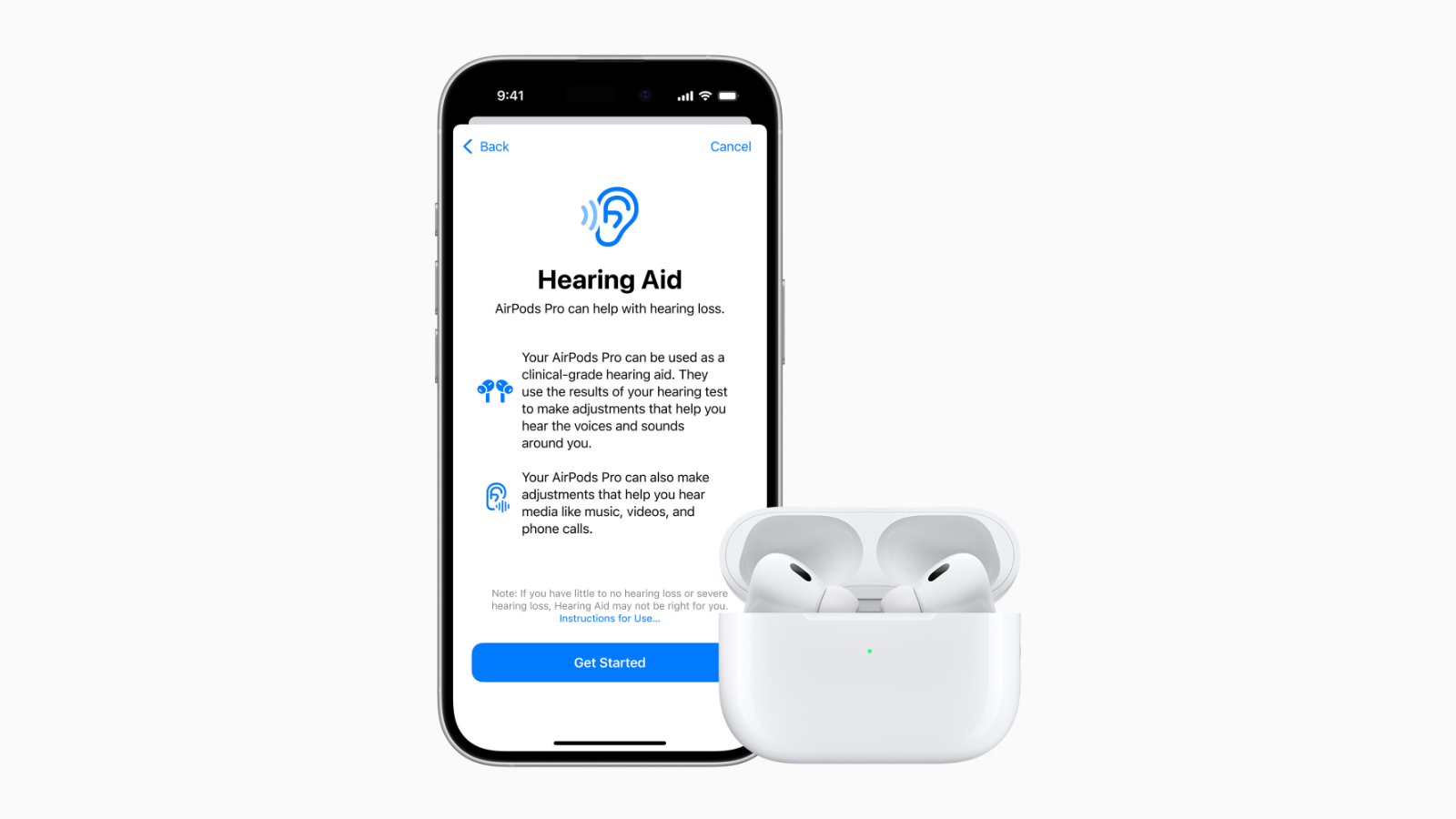
Your AirPods Pro 2 can function as basic hearing aids, amplifying conversations and environmental sounds. You can enable this feature in the Settings app under Accessibility ➝ Hearing Devices.
Bear in mind that the Hearing Aid feature isn't available everywhere. Apple maintains a list of regions and territories in which the feature can be accessed.
Taking the Hearing Test in Unsupported Regions
As we mentioned at the top of this article, Apple's Hearing Test feature isn't available in all regions and territories at the time of writing this, but that doesn't mean you can't take the test.
Instead, you can use the following deep link to directly access the test in the Health app: x-apple-health://HearingAppPlugin.healthplugin/HearingTest – tap the link or paste it into Safari on your iPhone or iPad and you will be taken straight to the test (thanks to Reddit user Special_Lake240). Alternatively, download this Apple Hearing Test shortcut, grab your AirPods Pro 2, then run the shortcut on your device to take the test.
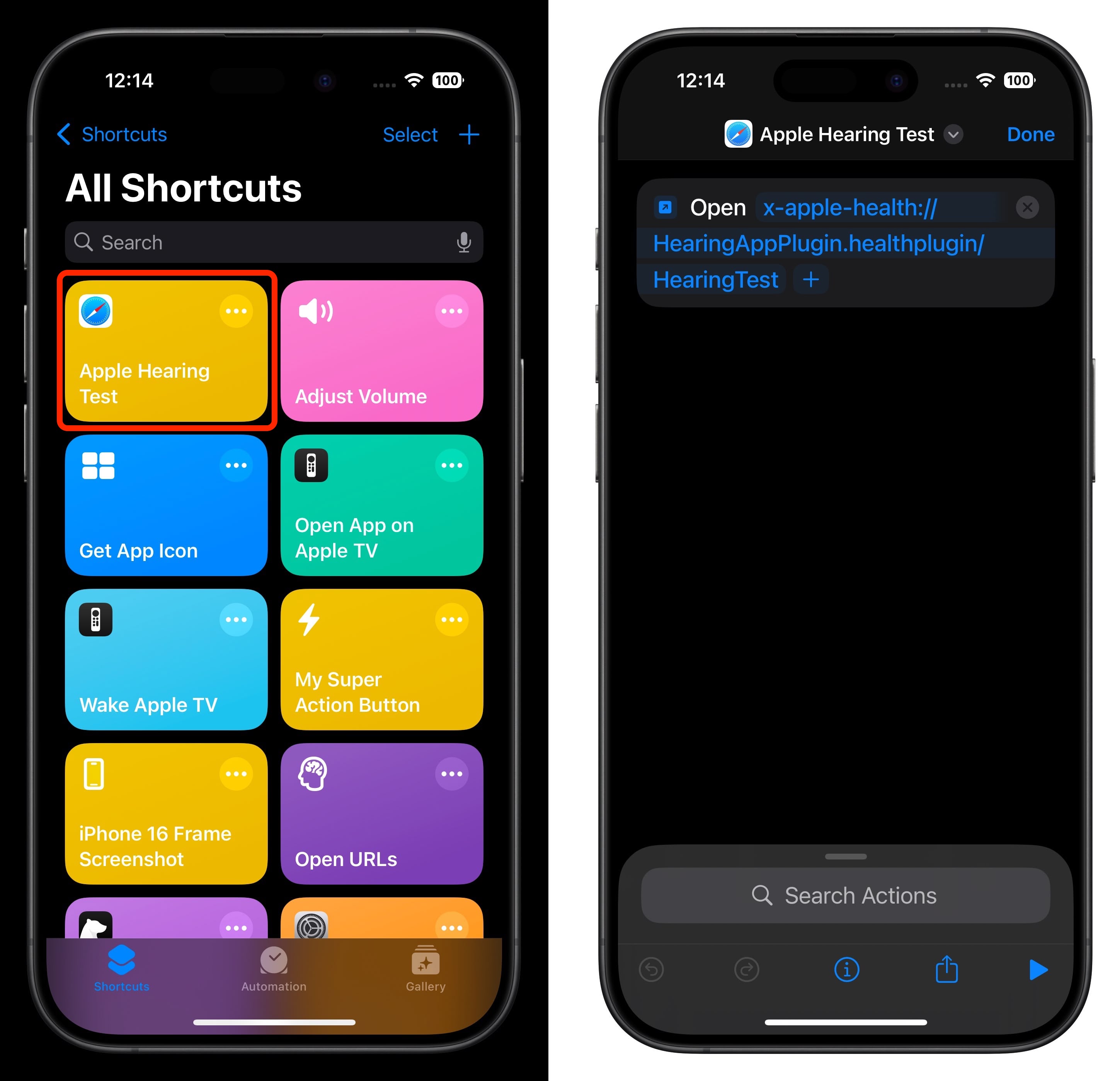
After taking the test using this method, your results will be available in the Health app. Just bear in mind that you won't be able to access Apple's other hearing health features like Media Assist and Hearing Test unless they are officially available in your region.
Article Link: iOS 18.1: Take a Hearing Test With AirPods Pro 2
Possible that the url to the test changed with the update. You'll have to wait until someone figures it out and shares a fix.I was able to take test on same day you uploaded this post but today I tried to open shortcut and it’s not loading is it because updated to iOS 18.2 beta 3 and AirPods firmware updated??
Register on MacRumors! This sidebar will go away, and you'll see fewer ads.


